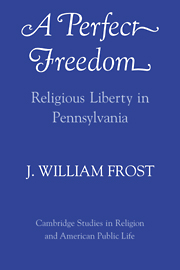Book contents
- Frontmatter
- Contents
- Acknowledgments
- Preface to This Paperback Reissue
- Introduction: The Pennsylvania Traditions of Religious Liberty
- I The Creation of Religious Liberty in Early Pennsylvania
- II Pacifism and Religious Liberty
- III The Clergy and Religious Liberty
- IV Religious Liberty in the Revolution
- V Religious Liberty and the Republic
- VI Politicians Debate Religious Liberty
- VII The Churches and Religious Liberty
- VIII The Legal Implications of Religious Liberty
- IX Religious Liberty and the Catholic and Jewish Minorities
- Epilogue: The Dismantling
- Notes
- Bibliography
- Index
VI - Politicians Debate Religious Liberty
- Frontmatter
- Contents
- Acknowledgments
- Preface to This Paperback Reissue
- Introduction: The Pennsylvania Traditions of Religious Liberty
- I The Creation of Religious Liberty in Early Pennsylvania
- II Pacifism and Religious Liberty
- III The Clergy and Religious Liberty
- IV Religious Liberty in the Revolution
- V Religious Liberty and the Republic
- VI Politicians Debate Religious Liberty
- VII The Churches and Religious Liberty
- VIII The Legal Implications of Religious Liberty
- IX Religious Liberty and the Catholic and Jewish Minorities
- Epilogue: The Dismantling
- Notes
- Bibliography
- Index
Summary
Religious liberty became a political issue in the election of 1800. The question, posed quietly by the Federalists in 1796, but loudly in 1799 was whether the religion of Thomas Jefferson – he was alleged to be an atheist or deist – was a danger to the United States. Because the Federal Constitution contained no religious test, the Federalists had to persuade the voters that Jefferson constituted a threat to their civil and religious liberties. The election of a governor in Pennsylvania in 1799 was a test case for the coming presidential vote. Governor Thomas Mifflin was retiring and his successor would be either Republican Thomas McKean, currently the state's chief justice, or Federalist James Ross, a member of the House of Representatives. Both parties used the religious issue in 1799. The Republicans claimed that James Ross was a deist who did not believe in original sin. McKean, by contrast, was a Christian and member of the Presbyterian church. Deists like Ross could not be trusted because they might become corrupted by power. The Federalists could not say McKean was a deist, but they could link the entire Republican party with the infidelities of France and assert that all Republicans were irreligious. McKean and the Republicans captured the governorship and the house, but Federalists still controlled the senate.
In retrospect the Federalist attack upon Jefferson's religion in 1800 appears disingenuous. Rational religion had already garnered many adherents in Massachusetts, including some clergy.
- Type
- Chapter
- Information
- A Perfect FreedomReligious Liberty in Pennsylvania, pp. 86 - 104Publisher: Cambridge University PressPrint publication year: 1990
- 1
- Cited by



